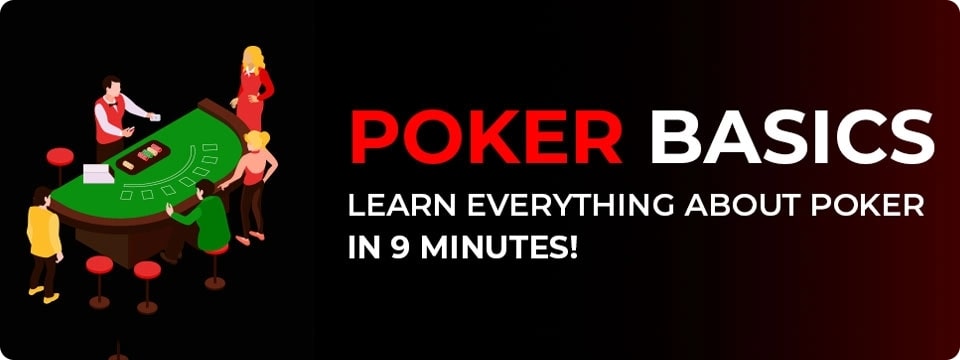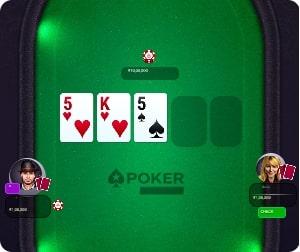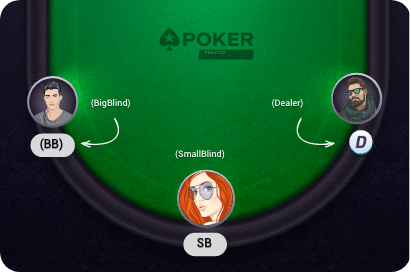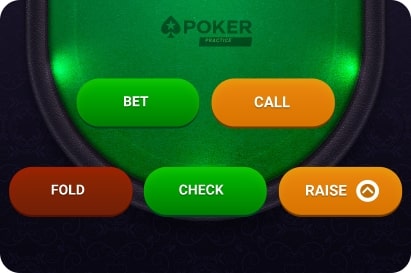How to Play Poker: Basic Rules

Concepts for New Poker Players
Poker is a game of strategy where each player’s objective is to prove that they have the best cards, i.e. the best hand. Usually poker in India is played by 2 to 9 players with one deck of cards, each player wagers/bets an amount of money or chips. The total amount of money wagered on the table is called the pot.
The objective of a player is not necessarily to win every round, but to win the pot at the end by making better decisions (mathematically and psychologically) about when (and how much) to bet, raise, call or fold.

Pro-tip : Junglee Poker uses Random Number Generator (RNG) algorithm for card shuffling to ensure 100% fair and transparent games. Players get the randomly shuffled cards at the start of every game.
To win, you need to strategize your actions on the basis of the cards you get. Learn more in the next section.
Poker Hands And their Rankings
In Texas Hold'em Poker (one of the most widely played poker variants), each player is dealt 2 private cards, called the hole cards. 5 cards, called community cards, are placed face down at the center of the table. As the name suggests, community cards are for the community and can be used by every player participating in the game. However, these 5 cards are revealed in rounds, which we will discuss later.
After hole cards and community cards are dealt, each player tries to form the best possible combination of 5 cards. It is called a hand. Every hand has a definite rank. Based on these ranks, a player decides to take the action of betting, calling, raising, or folding. For example, a royal flush (A♥-K♥-Q♥-J♥-10♥) has a higher rank than a straight flush (Q♥-J♥-10♥-9♥-8♥) and so on. To determine the winner at the end of the game, your hand’s rank will be compared with the ranks of the other players' hands. Usually, the player with the highest-ranking hand wins. We will discuss the other winning strategies later. The table below shows the different types of hands and their rankings. Please note that the ranking of individual cards (from high to low) is: Ace, King, Queen, Jack, 10, 9, 8, 7, 6, 5, 4, 3, 2.
Introduction to the poker table
A poker table usually has 2 to 9
players. The turn for taking action goes clockwise.
Who takes the first action in poker? Well, the answer to this question is simple and not so
simple at the same time.
The simple
answer is that the person on the immediate left of the dealer makes the first bet. We will
now discuss all the positions and their meanings.
Dealer: As the name suggests, the player in this position deals the
cards. The second person to join a game becomes the dealer on our platform. After that,
the dealer’s role keeps on passing (clockwise)
to the next player in every round at the table.
Blinds: Blinds are two other positions at a poker table. The players
sitting in these positions enter automatic bets as specified before the game starts.
There are two blind positions in poker.
Small Blind: The position on the immediate left of the dealer is
called the small blind. The small blind player makes a bet automatically.
Big Blind: The position on the immediate
left of the small blind is called the big blind. The player in this position has to
enter a bet which is double or more than double the small blind’s bet.
Now we will answer the complicated part of the question, “Who takes the first action in
poker?” The small blind is always the first person to take an action in the game. From
there, the turn for taking action continues clockwise, i.e. the next person
to take the action is the big blind.
Example: If the small blind bets 5 chips on the table, the big blind has to bet
10 or more chips. The last player to act in a round is the dealer. It means the
best position in poker is that of the dealer
as he/she can observe the other players and their actions.


Understanding the Rounds in Poker
There are 5 rounds in a No Limit Texas Hold’em game. The first round is for dealing the hole cards. The 5 community cards are revealed in 3 rounds. In the final round, all the players take their final action based on their cards and game strategy. Let’s understand these rounds in detail.
- Round 1. Pre-flop: In this round, the dealer deals hole cards to all the players. Based on these cards, each player takes an action. Once each player has taken an action and wagered an equal amount into the pot (or have folded), only then does the next round begin.
- Round 2. Flop: In this round, the first 3 community cards are revealed. Now all the players take action as per their strategies and the probability of making a higher ranking hand.
- Round 3. Turn: The 4th community card is revealed in this round. Again, the players take action according to their strategies. Once every player has taken an action and wagered an equal amount (or has folded) into the pot, the round to reveal the final card begins.
- Round 4. River: The 5th and final community card is revealed in this round. All the players take an action based on their hands. This leads us to the final round.
- Round 5. Showdown: All the players take their final actions and show their cards in this round. Now, either the person with the highest ranking hand or the person who has made everyone fold wins the pot.
Pro-tip : Observe the actions of other players to guess if they have a good hand. Mostly, players tend to raise and bet when they have a good hand.
In this section, we mentioned the word “action” a lot of times. Now, let’s understand what action means in poker.
Actions on the Poker Table
In a poker game, each player performs actions based on the cards in their hand and their game strategy. In simple words, taking action in poker means choosing to place a bet or sitting the round out.
After hole cards and community cards are dealt, each player tries to form the best possible combination of 5 cards. It is called a hand. Every hand has a definite rank. Based on these ranks, a player decides to take the action of betting, calling, raising, or folding. For example, a royal flush (A♥-K♥-Q♥-J♥-10♥) has a higher rank than a straight flush (Q♥-J♥-10♥-9♥-8♥) and so on. To determine the winner at the end of the game, your hand’s rank will be compared with the ranks of the other players' hands.

Usually, the player with the highest-ranking hand wins. We will discuss the other winning strategies later.
The table below shows the different types of hands and their rankings. Please note that the ranking of individual cards (from high to low) is: Ace, King, Queen, Jack, 10, 9, 8, 7, 6, 5, 4, 3, 2.
- Bet: It simply means wagering money on the table. The money is added to the pot prize. Make a bet at a poker table right now and see if you can win the pot.
- Call: When a player chooses to call, it simply means that they are matching the latest bet in that round. Normally, players choose to call when they are either hopeful that they can make a good hand or they are trying to hide the fact that they have bad cards.
- Raise: When a player chooses to raise, they make a bigger bet than the current highest bet in that round. The game gets really interesting at this point as it normally means that the player has a higher ranking hand or is bluffing. A very aggressive player can choose to raise even with bad cards to scare everyone into folding.
- Fold: When a player decides to fold, they decide not to play in that particular round. This can be a really good strategy if you want to wait and watch other players’ strategies.
- Check: If a player chooses to check, they are passing on their turn (to take an action) to the next player. This action is only available if the bets made by all the players at the table are equal.
- All-In: Going all-in means adding all the remaining chips to the pot. If a player goes all-in, it might mean that they have very good cards in hand, and they are looking to maximize their winnings. Aggressive players might also go all-in to bluff and force other players to Fold.
Secret Strategies Of Poker Experts
Poker is a skill game, and every skill game requires strategy and a variety of techniques. In poker games, most of the time, it’s the strategy that determines who wins or loses, not the cards. To provide you with the 5 finest poker tactics, we asked our poker gurus and picked the best ones for you. Take a quick look at them below and kick-start your winning streak in poker.
1.Remember the poker hands’ rankings well
To be an expert at poker, you
must understand the strength of poker hands. Does a flush
beat a straight? Does a full house beat a flush? What beats a full house? Learning the
poker rules, the positions,
and the hand rankings is the first step in becoming a pro poker player .
Learning the rules, the positions, and the hand rankings is the first step in becoming an expert at poker. However, mastering hand ranking is the most important skill. You shouldn't be in a situation where you are in the middle of the hand and have to check the rankings chart to figure out whether your flush will beat a straight.

2. Start with low stakes
Starting with low stakes is a wise decision because it
will allow you to learn the game without spending a lot. Start out with small bets if you
want to become an expert at poker. You will
feel more secure knowing that you are not putting a large amount of money at risk, and even
if you lose some at first, it will not harm you badly but only help you learn from your
mistakes.
3. Stick to a single table
Learn poker by getting as much information as
possible. So try to gain as much knowledge about one table and the players as you can. In
the showdown, keep an eye on how your opponents
are playing and what cards they have.
4. Don’t bluff too much
Bluffing too much doesn’t work when you raise the
stakes and start playing bigger games. Since people prefer to play more aggressively and
bluff more in big stakes games, you will need to
bluff very carefully.
5. Learn when to fold
Knowing when to fold is arguably the most critical skill
in the game. The world’s best players know this and fold more often than you think. Fold
when a player who never bluffs is betting
big or when you have no pair or no possibilities of having a strong hand after the flop.
Don’t assume that folding is losing. You’re saving your chips for another hand and for staying alive a bit longer. If you think you’re losing a hand and waiting for a single card to make it or break it, you should fold.